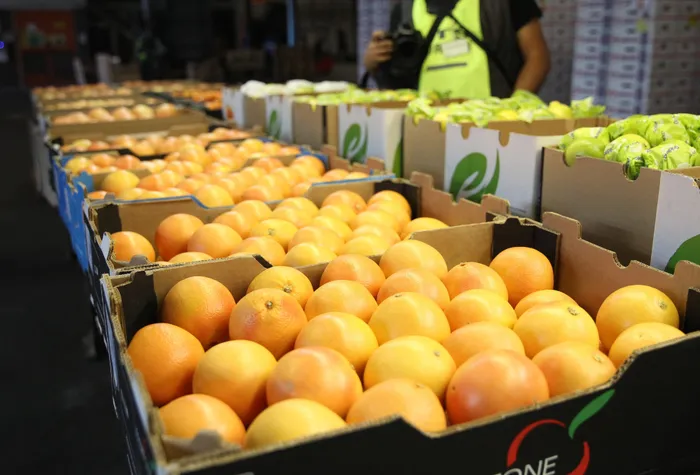SA citrus industry urge swift negotiations to exempt seasonal produce from US tariffs
AGRICULTURE

The Citrus Growers Association of Southern Africa (CGA) in a statement on Wednesday said they want an exemption for seasonal fresh produce from US President Trump tariff.
Image: Doctor Ngcobo / Independent Newspapers
The Citrus Growers Association of Southern Africa (CGA) on Wednesday sounded the alarm over impending tariffs announced by US President Donald Trump, which could impose a substantial 30% levy on South African exports starting 1 August, should no trade agreement be reached.
The call for an exemption specifically targeting seasonal fresh produce underlines the potential economic devastation facing South Africa's citrus farming communities, particularly if their products become uncompetitive in the American market.
In a statement, the CGA expressed solidarity with Minister of Agriculture John Steenhuisen, who welcomed the challenge to negotiate a trade deal beneficial to both countries during his Budget Vote Address on Tuesday.
The CGA noted that South Africa must act swiftly in the coming weeks to secure its crucial trade relationships. In his speech, Steenhuisen emphasized the importance of the agricultural sector in job creation, a sentiment echoed by the CGA leadership.
“We agreed with the Minister, as he stated in the opening of the address, that South Africa now has an opportunity to use the next few weeks to urgently negotiate and conclude a deal that benefits both parties,” said Gerrit van der Merwe, chairperson of the CGA.
“Seasonal fresh produce is not like a product produced year-round in a factory. SA citrus growers do not threaten US citrus growers or US jobs. In fact, our produce sustains interest and demand for citrus when local US citrus is out of season, eventually benefitting US growers when we hand over consumers at the end of our season.”
Van der Merwe also said that only citrus from the Western and Northern Cape was exported to the US, adding that entire rural economies like that of Citrusdal were sustained by the US export citrus market.
“A 30% tariff would wreak havoc on these communities. For most growers, it is not as simple as substituting one export market with another one. Even so, some producers from the Western and Northern Cape may have little choice but to try to increase shipments to other countries, rather than face severely diminished returns from the US,” he said.
“Such a diversion will add to citrus volumes in those other markets and cause an oversupply, which can substantially reduce returns for all South African citrus producers.”
The CGA emphasised that Steenhuisen had, in his Budget Vote, also highlighted the agricultural sector's ability to contribute to job creation in South Africa.
Dr Boitshoko Ntshabele, CEO of the CGA, said it was significant that the goals Steenhuisen outlined included market access expansion.
“The single biggest market for SA citrus - the European Union (EU) - is unfairly restricted because of unnecessary and unscientific plant health measures imposed by the EU on South African citrus,” Ntshabele said.
“South Africa's first-ever trade dispute cases at the World Trade Organisation are focused on these measures, and a favourable resolution to the cases can stimulate immense growth in the citrus industry.”
Ntshabele said they were committed to strict application of plant health and biosecurity measures where they are scientifically justified and in the interest of actual biosecurity.
Ntshabele said that they appreciated the focus Steenhuisen has placed on biosecurity.
“We have seen citrus diseases wreak havoc in Brazil and the US state of Florida, to name just two examples. South Africa must remain vigilant. As the Minister stated, biosecurity is not just a veterinary issue; it is a national priority,” he said.
“Without urgent attention to expanded market access and ever-vigilant biosecurity, the citrus industry, just like many other agricultural industries, will lose their ability to create jobs and help grow the South African economy.”
Dawie Maree, head of FNB Agriculture Marketing and Information, said that there is still a lot of uncertainty regarding the tariffs and at what level South African exports will be tariffed.
“The 30% level is still on the table, but there are still two weeks in which the SA trade negotiators can reach a deal with the US,” Maree said.
“But we have the additional challenge that SA is part of SACU, and as such, all countries must agree on a tariff dispensation.”
Meanwhile, Grain SA said that they support the new policy direction outlined in the 2025/26 Budget Vote Speech by Steenhuisen.
“The realignment of the Department of Agriculture to exclusively serve the sector presents a renewed opportunity for targeted implementation and meaningful impact,” Grain SA said.
“We are particularly encouraged by the Minister’s prioritisation of biosecurity as a national imperative. Grain SA has long advocated for enhanced disease surveillance and coordinated outbreak responses, not only to safeguard local production but also to secure and expand critical export markets.”
BUSINESS REPORT

The Citrus Growers Association of Southern Africa (CGA) in a statement on Wednesday said they want an exemption for seasonal fresh produce from US President Trump tariff.
Image: Doctor Ngcobo / Independent Newspapers